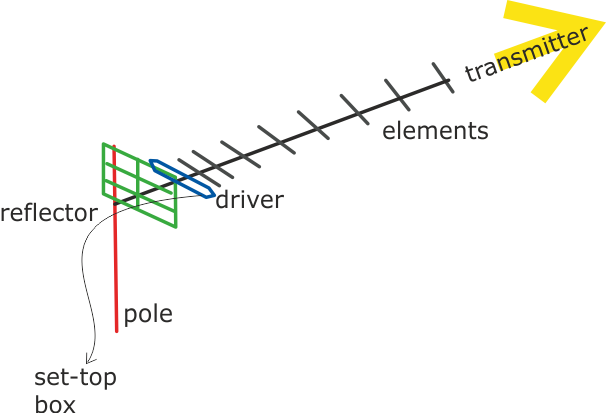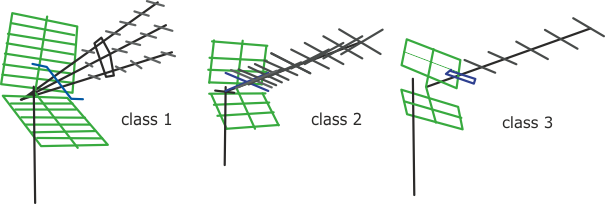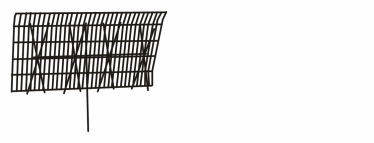Freeview reception - all about aerials
 Brian Butterworth published on UK Free TV
Brian Butterworth published on UK Free TV Updated 8th January 2014.
Your ability of receive all the Freeview transmissions depends on the suitability of aerial
- the design style,
- the "group", and
- its physical location.
Standard type - Yagi aerial

The standard type of TV aerial is known as the Yagi aerial. It is mounted on a pole, and consists of a rod with a reflector (shown green) at the back and many spiky elements (in grey) at the front. The connecting cable connects to the element nearest the reflector, known as the driver (shown in blue).
These Yagi aerials are directional and so pick up signals best from a transmitter that the rod points towards. The more elements the aerial has, the better it picks up a signal and becomes more directional.
A standard-type aerial is all that is required for digital TV reception in most places. These antennae have between 10 and 18 elements and a single reflector. These are recommended for new installations for good digital television reception, but will more often than not function perfectly in good reception areas.
Typically these aerials are designed to receive only some transmission frequencies - see "groups" below.
High Gain aerials

These aerials are designed for poor digital reception areas, and have two reflectors. For maximum signal strength, some digital high gain aerials have up to 100 elements. Since the switchover to digital-only transmissions back in October 2012, most UK households now have good quality digital TV signals.
A more expensive aerial is only required where the signal strength is low, but can often provide the whole Freeview reception where it might otherwise be impossible.
The CAI (that represents aerial installers) has four standards for digital TV aerials. The highest standard "1" is for homes on the fringes of coverage areas, intermediate standard "2" is suitable for use within the coverage area; minimum standard "3" is for good coverage conditions.
These aerials can be either wideband, or receive only selected frequencies - see "groups" below.
Grid

You may haved used a 'Grid aerial' for analogue reception, but as they are generally unsuitable for Freeview reception, they have now generally been replaced by the Yagi type. However in some places a Grid aerial installation may work for Freeview: otherwise replace with a standard Yagi aerial.
Indoor
Indoor aerials are generally not suitable for Freeview reception. In areas of good signal strength it is often possible to receive some transmissions. Even where an aerial works, people often find that may get interruptions to their viewing (or recording).Loft mounted
Loft mounted arrivals are not generally recommended for Freeview reception, as the roof tiles and plumbing will degrade the signal. Some compensation for this loss of signal can be made by using satellite-grade cable to connect the set top box to the aerial.Positioning
The best position for a TV aerial is mounted outdoors, as high from the ground as possible, pointing directly at the transmitter. The signal can be blocked by hills and tall buildings. It should be positioned away from any other aerials.Horizontal or vertical?
The transmitter will either use vertical mode which requires the elements of your aerial to be up-down, or horizontal mode which requires them to be level with the ground.Groups
Both analogue and digital television is transmitted the same group of transmission frequencies (known as channel 21 through to 60). A coloured marking on the aerial shows the group.
To create the best possible analogue picture, TV transmissions from adjacent transmitters have been designated to several different groups of frequencies. By using an aerial that receives only the channels in the correct group, the analogue picture can be kept free from interference.
To receive Freeview transmissions from the same transmitter it has been sometimes necessary to use frequencies that are not part of the transmitter's normal group. When this has occurred, the aerial will need to be replaced with a "wideband" aerial (also known as group W) - one that covers every group.
As Ofcom is planning to move the TV frequencies again - perhaps as soon as 2018 - it may be wise to use a wideband aerial if you can to ensure you can keep viewing Freeview for many years to come.
Help with Television sets?
Wednesday, 26 January 2011
M
Michelle7:23 PM
I'm sorry if this is a silly question, but how do you know if you are getting HD reception? I am in the Burgess Hill area.
| link to this comment |
Michelle: If you mean "when will I get HD reception" then the answer is today on Freesat HD (or Sky HD), 2012 for Freeview HD.
If you mean "is the channel I am watching in HD" then you don't really need to do more than get close to the screen. If you can see detail close to the screen, it is HD, if you can see blocky pixels, it is not HD.
| link to this comment |
R
russell kemp10:42 PM
hi,i've just put a new aerial (cat2) in my loft to provide freeview for 3 lcd tv's. one (toshiba) is great with no break up of picture,one other (tecknica) is rubbish with only 6 dtv channels found and constant breakup and the third (lg) has found 46 channels but also constant breakup. I am using a booster picture quality is good but constant breakup, why is it fine on one tv but not the others?do i need to mount the aerial outside?
| link to this comment |
Thursday, 27 January 2011
K
kev8:06 AM
Derby
I live in DE24 0TR, please advise on best transmitter and aerial reception type
| link to this comment |
kev's: mapK's Freeview map terrainK's terrain plot wavesK's frequency data K's Freeview Detailed Coverage
M
MR PAUL TAYLOR12:36 PM
Can you please tell me what aerial would i need for the c/Durham crook area
many thanks
| link to this comment |
A
Andrew9:48 PM
Hi,we are switching to digital later this year and currently have BBC1&2, ITV &C4. At the moment we have a loft aerial that I'd like to replace and run 3 tv sets off the new one (an extenal aerial - seems to be the best bet). Any ideas as to the best type of aerial? We live opposite the Ripponden (West Yorks - HX64DZ) transmitter and have direct line of sight of it. Thanks Andrew
| link to this comment |
Friday, 28 January 2011
J
jb388:28 AM
Andrew: Judging by your location of only being approximately 12 miles away from the main Emley Moor transmitter and yet your area is being served by a relay station makes it rather obvious that the terrain around your area causes severe reception problems, so if after switchover Emley Moor is still out of the equation I would suggest that an easy to mount / low wind resistance log periodic aerial be fitted externally and with this being fed into a standard (not high gain version) 3 way booster / splitter fitted in the loft.
| link to this comment |
MR PAUL TAYLOR: Please put your postcode into the box at the top right.
| link to this comment |
Select more comments
Your comment please!